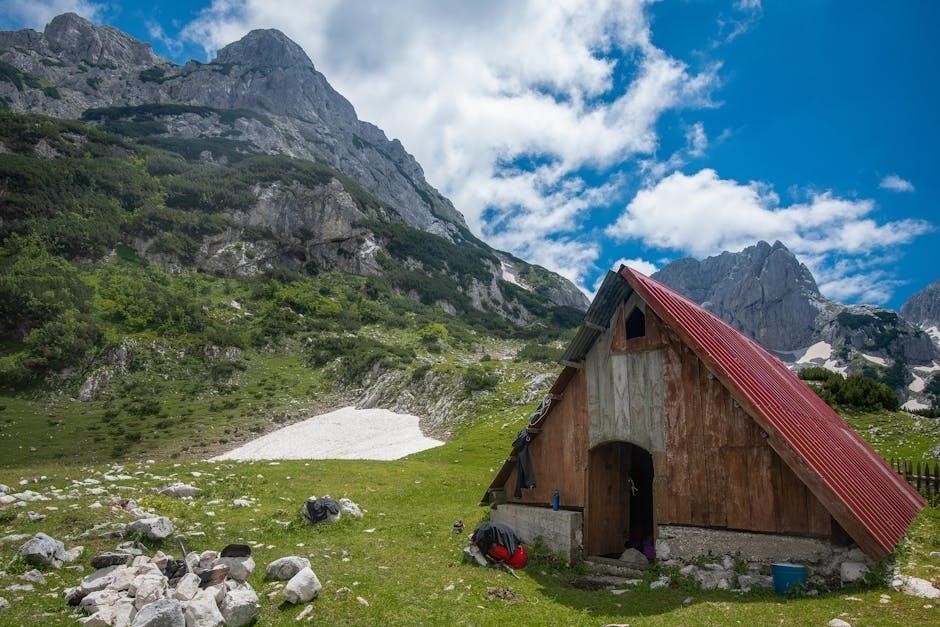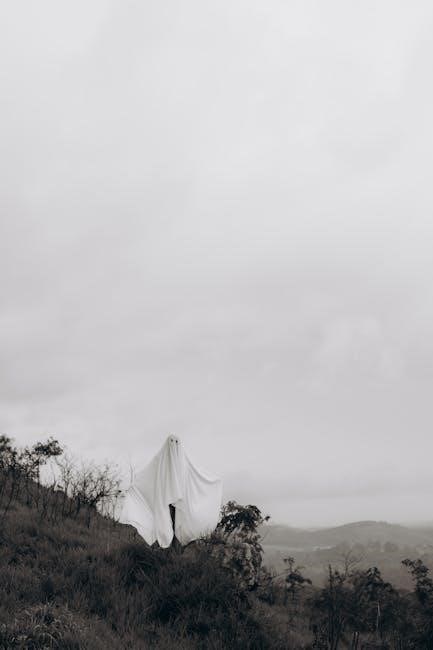haunting of hill house pdf
Summary
Get your copy of The Haunting of Hill House PDF for free. Read Shirley Jackson’s classic horror novel online or download it instantly. Start your chilling journey today!

Shirley Jackson’s masterpiece is a chilling exploration of fear, trauma, and the supernatural, weaving a psychological ghost story that continues to captivate readers with its intricate depth․
Overview of the Novel and Its Significance
The Haunting of Hill House is Shirley Jackson’s 1959 gothic horror masterpiece, exploring psychological terror and the supernatural․ The novel centers on four characters invited to stay in the infamous Hill House, a mansion with a dark history of ghostly occurrences․ Known for its unreliable narration and deep psychological complexity, the book blurs the lines between reality and the characters’ inner turmoil․ Its significance lies in its influence on horror literature and media, offering a chilling study of fear, isolation, and the human psyche․ The novel’s enduring legacy solidifies its place as a horror classic․

The Novel’s Background and Publication
The Haunting of Hill House, published in 1959, is Shirley Jackson’s seminal work, blending psychological horror with supernatural elements․ It was a National Book Award finalist, solidifying its literary status as a gothic horror classic․
Shirley Jackson’s Inspiration and Writing Process

Shirley Jackson drew inspiration from classic horror themes and her own experiences with isolation․ She crafted a psychological ghost story, blending supernatural elements with deep character analysis․ Jackson focused on creating an unsettling atmosphere, personifying Hill House as a living entity․ Her meticulous writing process ensured the house’s presence permeated every scene․ By exploring themes of mental instability and fear, Jackson delivered a masterpiece that transcends traditional horror, leaving readers questioning the line between reality and madness․ Her unique approach solidified the novel’s enduring legacy in horror literature․

The Novel’s Reception and Critical Acclaim
Since its publication in 1959, The Haunting of Hill House has garnered widespread critical acclaim for its masterful blend of psychological horror and atmospheric tension․ It was a finalist for the National Book Award and is widely regarded as one of the greatest ghost stories ever written․ Critics praise Jackson’s ability to craft a chilling narrative that explores the complexities of fear, trauma, and the human psyche․ The novel’s ambiguous ending and unreliable narration have sparked endless debates, cementing its legacy as a horror classic that continues to influence literature and media today․

The Haunting of Hill House: Plot Summary
Dr․ Montague invites guests to Hill House to investigate paranormal activity, leading to terrifying events that blur reality and illusion, culminating in Eleanor’s tragic fate․
Dr․ Montague’s Paranormal Investigation
Dr․ John Montague, a professor with a passion for the supernatural, rents the notorious Hill House to investigate its paranormal activity․ He carefully selects participants with prior experiences, aiming to gather evidence of the house’s haunting․ The group encounters strange occurrences, including unexplained noises and movements, which escalate as they delve deeper․ Montague’s investigation seeks to understand the house’s phenomena, but the house’s malevolent presence challenges his academic detachment, leading to a chilling exploration of fear and the supernatural․
The Four Main Characters and Their Roles
The story revolves around four distinct individuals invited by Dr․ Montague to Hill House․ Eleanor, fragile and psychologically vulnerable, is central to the haunting․ The bohemian Theodora brings a free-spirited perspective, while Luke, the skeptical heir, seeks adventure․ Dr․ Montague himself is driven by academic curiosity, aiming to uncover the house’s secrets․ Each character’s unique traits and backstories intersect, creating a dynamic that amplifies the house’s eerie influence and their personal struggles, leading to a tragic confrontation with the supernatural forces at play․
The Climax and Eleanor’s Tragic Fate
The climax occurs as Eleanor becomes fully possessed by Hill House, symbolizing her psychological unraveling․ Her death marks the devastating conclusion, as she becomes one with the house․ This tragic end highlights the house’s overwhelming influence and Eleanor’s fragile psyche, leaving a haunting legacy in horror literature․
Themes and Symbolism in the Novel
Shirley Jackson’s The Haunting of Hill House explores themes of psychological fear, trauma, and isolation, with the house symbolizing the characters’ inner turmoil and dread․
The Psychology of Fear and Trauma
The novel masterfully explores the psychology of fear and trauma, delving into the inner turmoil of its characters․ Eleanor’s fragile mental state and repressed emotions are central, as the house amplifies her vulnerabilities․ The supernatural events blur the lines between external horrors and internal psychological struggles, leaving readers questioning what is real․ Jackson’s portrayal of fear as a deeply personal and subjective experience adds layers of complexity, making the horror both visceral and intellectually unsettling․ The house becomes a mirror of the characters’ darkest fears and unaddressed traumas․
The House as a Character: Symbolism and Atmosphere
Hill House is more than a setting; it is a living, breathing entity with its own sinister personality․ Its labyrinthine design and shifting layout symbolize the unpredictability of fear and the chaos of the human psyche․ The house exudes an oppressive atmosphere, with its cold, empty spaces and unsettling decor mirroring the emotional voids of its inhabitants․ Through its presence, Jackson crafts a sense of inescapable dread, making Hill House a character that actively shapes the story’s tension and horror, embodying the darkness within and around its occupants․
Character Analysis
Shirley Jackson crafts complex, deeply human characters, each with unique psychological struggles, whose interactions with Hill House reveal their innermost fears and vulnerabilities, driving the narrative’s tension․
Eleanor’s Psychological Journey
Eleanor’s journey in “The Haunting of Hill House” is a profound exploration of her fragile psyche․ Her isolation and guilt over her mother’s death make her vulnerable to the house’s haunting forces․ As the story unfolds, Eleanor’s grip on reality falters, revealing a deeply fractured identity․ The house’s supernatural influence exacerbates her inner turmoil, blurring the lines between external horror and her psychological breakdown․ Ultimately, Eleanor’s tragic fate underscores the devastating interplay between personal trauma and the malevolent energy of Hill House․
The Role of Dr․ Montague and His Motivations
Dr․ John Montague, a professor of anthropology, is driven by a fascination with the paranormal and a desire to prove its existence․ He rents Hill House, a notoriously haunted mansion, to conduct a thorough investigation․ Montague carefully selects participants, hoping their experiences will provide empirical evidence of the supernatural․ His academic curiosity often clashes with the emotional toll the house takes on its inhabitants, revealing a complex mix of scientific detachment and personal obsession․ Montague’s presence sets the story’s eerie events in motion, making him both a catalyst and an observer of the haunting․ His motivations blur the line between intellectual pursuit and personal fixation, adding depth to the narrative․ Ultimately, Montague’s investigation becomes a testament to the power of belief and the unpredictable nature of the unknown․

Adaptations and Cultural Impact
The Netflix series, released in 2018, reimagines Shirley Jackson’s novel, captivating audiences with its complex narrative and emotional depth, solidifying Hill House’s place in horror culture․
The Netflix Series and Its Reimagining
Netflix’s The Haunting of Hill House, released in 2018, offers a fresh, non-linear interpretation of Shirley Jackson’s novel, focusing on the Crain family’s traumatic experiences․ The series explores themes of grief, mental health, and familial bonds, weaving the supernatural elements of Hill House into a deeply emotional narrative․ Creator Mike Flanagan’s vision expands the original story, introducing new characters and plotlines while maintaining the eerie atmosphere that defines the house as a central character․ Its success has cemented Hill House’s legacy in modern horror culture․
The Novel’s Influence on Horror Literature and Media
The Haunting of Hill House has profoundly shaped horror literature and media, setting a new standard for psychological terror․ Its exploration of trauma, unreliable narratives, and the blurring of reality and fantasy has inspired countless adaptations, including films, TV series, and even modern horror writing․ The novel’s atmospheric tension and ambiguous haunting have influenced creators to experiment with subtle scares and deep character studies, solidifying its role as a cornerstone of the genre․ Its legacy continues to resonate, ensuring its impact on horror storytelling endures․

Literary Significance and Legacy
The Haunting of Hill House is a landmark in horror literature, celebrated for its psychological depth and masterful storytelling․ Its exploration of fear and trauma has cemented its status as a timeless classic, influencing countless works in the genre and leaving a lasting impact on both literature and popular culture․
Why “The Haunting of Hill House” Remains a Classic
Shirley Jackson’s The Haunting of Hill House endures as a horror masterpiece due to its psychological depth, atmospheric brilliance, and exploration of human vulnerability․ Its unreliable narration and ambiguous hauntings leave readers questioning reality, fostering timeless intrigue․ The novel’s influence on horror literature and media is profound, inspiring adaptations and reimaginations․ Its ability to evoke fear through subtlety and psychological complexity ensures its relevance, making it a cornerstone of the genre․ Jackson’s legacy is cemented in this chilling tale that continues to captivate audiences with its enduring mystery and emotional resonance․
Modern Interpretations and Theoretical Perspectives
Modern scholars and theorists continue to explore The Haunting of Hill House through various lenses, such as feminist, queer, and psychoanalytic perspectives․ Some interpret Eleanor’s journey as a metaphor for female oppression and mental health struggles․ Others analyze the house as a symbol of internalized trauma and psychological fragmentation․ Queer theorists explore themes of repressed desire and non-traditional family structures․ The novel’s ambiguity invites endless interpretation, making it a rich text for academic and cultural analysis․ Its timeless themes resonate with contemporary audiences, ensuring its enduring relevance in horror literature and media studies․
The Haunting of Hill House remains a cornerstone of horror literature, its exploration of fear, trauma, and the supernatural continuing to captivate audiences with its timeless legacy․
The Lasting Influence of Hill House on Horror
Shirley Jackson’s The Haunting of Hill House has left an indelible mark on the horror genre, inspiring countless adaptations and reimaginings․ Its psychological depth and atmospheric tension have influenced both literature and film, setting a benchmark for ghost stories․ The novel’s exploration of fear as a internal and external force continues to resonate, while its ambiguous ending challenges readers to question reality․ The Netflix series, among other adaptations, underscores the timeless appeal of Hill House, cementing its legacy as a cornerstone of horror culture․